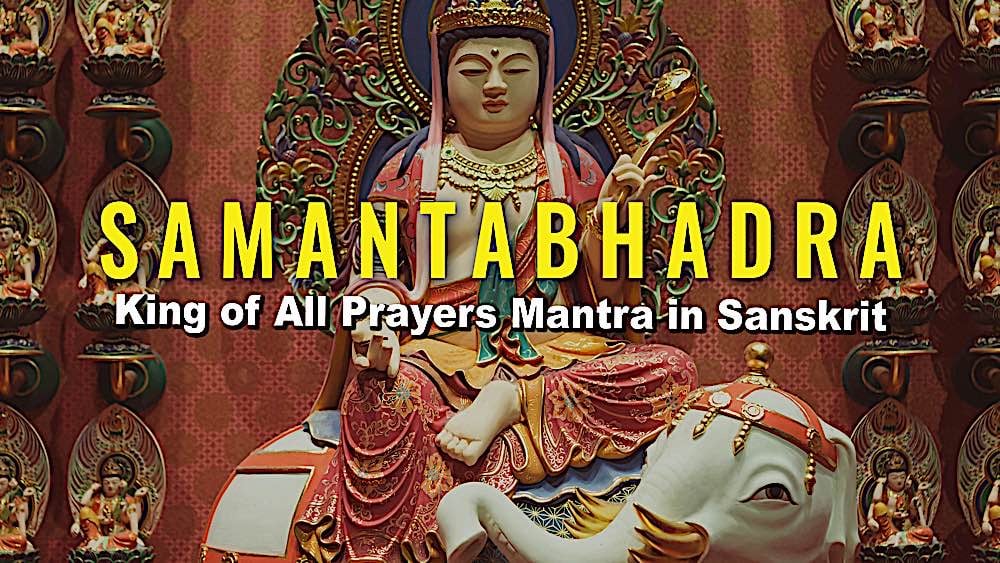Video: King of All Prayers Dharani chanted in Sanskrit — a complete Buddhist practice with all seven limbs
After a 3-minute introduction (time indexes below), we chant the extraordinary King of Aspirational Prayers of Samantabadhra in original Sanskrit. Most Mahayana Buddhists practice translated forms of this prayer with their daily practice.This is the concise form, containing all...

After a 3-minute introduction (time indexes below), we chant the extraordinary King of Aspirational Prayers of Samantabadhra in original Sanskrit. Most Mahayana Buddhists practice translated forms of this prayer with their daily practice.This is the concise form, containing all seven limbs of practice.
CONTENTS 0:00 Introduction Why is the King of Prayers, the King?
00:45 A complete Buddhist practice “how to”
01:14 The seven limbs of practice as remedies for seven poisons in Buddhism
02:32 Visualization from the Gaôçavyüha chapter of the Avatamsaka Sutra
03:42 Chanting of the King of Aspiration Prayers in Sanskrit (with hard sub Sanskrit for chanting and English for translation.)
Why is the King of Prayers, the king?
This prayer, recommended by many Mahayana teachers, is translated as “The Extraordinary Aspiration of the Practice of Samantabhadra” and is from the Gandavyuha Sutra.
Samantabhadra, Universal Good Bodhisattva, offers us the entire path to becoming a Bodhisattva, for the benefit of all sentient beings! It’s literally, in modern terms, a complete “how-to.” It is also a complete practice. Reciting this prayer, in sacred Sanskrit, together with Refuge and Dedication is literally a complete daily Bodhisattva practice. It includes all “seven limbs of practice” and the Bodhichitta vow and aspiration.
The seven limbs are the “remedies” for the “Poisons” in Buddhism. These are: Prostration and devotion, which purifies the poison of our arrogance Offerings to all the Buddhas and Bodhisattvas without exception which purifies the poison of greed Confession of Negativity and past faults, which purifies the poison of anger Rejoicing the virtue of all Buddhas and Bodhisattvas, which purifies the poison of wrong views Requesting the Buddhas and Bodhisattvas continue to turn the wheel of Dharma and teachings, which purifies the poison of doubt Requesting the Bodhisattvas not pass into Nirvana, asking they remain in Samsara to save all beings from suffering, which purifies the poison of ignorance Dedicating the merit of all devotion, offerings and practice to the benefit of all sentient beings, which purifies the poison of jealousy.Although frequently translated, it is an especially empowered practice when chanted in sacred Sanskrit.
In Devanagari, the King of Prayers is:
यावत के च दशश लोके सवयवगता नरसहाः। तान वदम सव अशेषान् कायतु वाच मनेन सः ेरजोपमकायमाणैः सवजनान करोम णामम्। सवजनाभमुखेन मनेन भचरीणधानबलेन एकरजा रजोपमबुा बुसुतान नषणकु मये। एवमशेषत धमतधातुं सवाधमुयम पूण जनेभः तेषु च अयवणसमुान् सववरासमुतेभः। सवजनान गुणान् भणमान- तान् सुगतान् तवमी अ सवान् पुपवरेभ च मायवरेभ- ṣ वावलेपनछवरेभः। दपवरेभ च धूपवरेभः पूजन तेषु जनान करोम ववरेभ च गवरेभ- णपुटेभ च मेसमेभः। सववशवयूहवरेभः पूजन तेषु जनान करोम या च अनु र पूज उदारा तान धमु य म सव जनानाम्। भ चरीअ धमु बलेन व द म पूजयमी जन सवा न य कृ तं म य पाप भवे या रागतु ेषतु मोहवशेन। ṣ कायतु वाच मनेन तथैव तं तदेशयमी अ सव म् य दश श पु य जग य शै अशै येक जनानाम्। बु सुतानथ सव जनानां तं अनुमोदयमी अ सव म् ये च दश श लोक द पा बो ध वबु अस त ा ताः। तान स व अ येष म नाथां च अनु र वत नताय व दनपूजनदे शनताय मोदन येषणयाचनताय।य शुभं म य सं चतु क चद् बोध य नामयमी अ सव म आकाश य तः यावत्, याव जगतः तः । तावम् मम तःभूयात् जग ःखा न न नतः
You might visualize, as recorded in the original Sutra by Sudhana who meets Samantabhadra. As he listens to the Aspiration prayer, he sees visions of all worlds and universes of the past the present and the future. Joyfully, he looks more closely and sees infinite Buddha Purelands in every pore of Samsantabhadra’s body. He sees countless Buddha’s and Bodhisattvas in the very atoms that make up the body of Universal Good Bodhisattva Samantabhadra.
As with Sudhana, as we chant this prayer, we try to imagine we are taking refuge, prostrating to, making offerings, confessing, rejoicing and requesting of every Buddha and Bodhisattva in every time, every world and every Pureland.
#Samantabhadra #Bodhisattva #Mahayana #Buddhism #buddhistmantra #sanskritprayer #sanskritchants #tibetanbuddhism

 Kass
Kass 






























